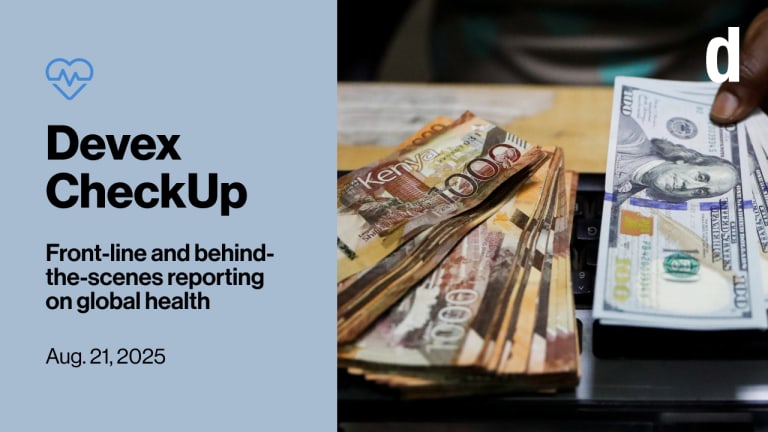
MANILA — As winter sets in Mongolia, the government anticipates a high incidence of flu — and the potential overuse of antibiotics.
As flu cases increase, many individuals are sparked to take unnecessary antibiotics, said Amarjargal Choijoo, senior officer at the Mongolia Ministry of Health division of pharmaceuticals and medical devices. Doctors might also prescribe antibiotics to patients with flu to help prevent a secondary bacterial infection, she said.
But the flu and the cold season are not the only culprits driving antibiotic overuse in the country.
“One of the key factors that contribute to the overuse of antibiotics in Mongolia is the disease pattern of the population,” Choijoo told Devex in an email.
While Mongolia has seen an increase in noncommunicable diseases, infectious diseases such as respiratory tract and genito-urinary tract infections remain among the leading causes of morbidity in the country. Sexually transmitted infections and tuberculosis, including multidrug-resistant TB, are also high. STIs accounted for 38.3% of new cases of communicable diseases in the country in 2018, according to Choijoo.
Antibiotic use in Mongolia was highest among the 65 countries and areas included in WHO’s surveillance report in 2018 — 64.4 defined daily dose per 1,000 population, although Choijoo said the data was old, based on 2015 figures. A more recent study in 2019 showed the daily dose consumption of antibiotics per 1000 population had decreased by 21.3%, to 50.7 in 2018, she said. She attributes this to the government’s nationwide “antibiotics only by prescription” campaign.
Even that lower number still ranks higher than Iran, which was second-highest on the WHO report ranking with 38.78 defined daily dose consumption of antibiotics per 1,000.
Mongolia has some policies, regulations and clinical guidelines for antibiotic use, but Choijoo said these are “fragmented and duplicated over a number of authorities,” resulting in weak enforcement, monitoring, and coordination.
More on antimicrobial resistance
► A global hub for antimicrobial resistance is taking shape
► Opinion: It takes a coalition to defeat antimicrobial resistance
► Opinion: Our frontline defense against ‘superbugs’ is fatally weakened
For instance, antibiotics are being dispensed even without the required prescriptions — particularly in small private pharmacies located in rural areas, Choijoo said. There aren’t enough law enforcers to inspect and ensure policies and regulations are being implemented properly. In addition, patients often self-diagnose and self-medicate.
The country also lacks national guidelines on antibiotic use for infectious diseases and sometimes is inconsistent with its recommendations.
A 2013 study in Mongolia showed that in 84% of cases, inappropriate antibiotic prescriptions were given for community-acquired pneumonia. Mongolia prohibits injection prescriptions for non-hospitalized patients, but the study found they are still being used outside the hospital by adults and children. The study found that gentamicin, an antibiotic, is recommended for the treatment of community-acquired pneumonia among children, but the drug is only available in injection form.
The government is aware of the risks involved with antibiotic overuse and misuse, particularly antimicrobial resistance. Although data on resistance rates in Mongolia is still sparse, Choijoo said, there has been a rise in cases of multidrug-resistant TB and gonococcal infections.
Data from Mongolia’s National Center for Communicable Diseases in 2019 also showed an increase in methicillin-resistant Staphylococcus aureus, or MRSA infections in 2019, the majority of which came from medical wards, Choijoo said. These are infections caused by a type of bacteria that has become resistant to commonly used antibiotics, including amoxicillin and penicillin.
The government has received support from international partners to help address the issue. An Asian Development Bank-funded health sector project helped improved microbiology laboratory capacity in select tertiary and secondary hospitals. WHO’s regional and country offices have provided technical and financial support on government action plans, surveys, and training on antimicrobial stewardship.
Mongolia currently has a multisectoral action plan to 2020 to combat AMR, and this is being implemented with support from WHO, ADB, and the Food and Agricultural Organization.
The country’s health insurance general agency has also introduced an e-prescription system aimed at ensuring medicines are being dispensed only with a prescription, although there’s a law loophole: only medicines prescribed by primary health care doctors are reimbursable under the country’s health insurance law.
“It is being planned to extend this to secondary level outpatient care. Last year some pediatric medicines included in the reimbursement list, irrespective of doctors/health care level, were already reimbursed,’ Choijoo said.
But beyond stewardship programs, Choijoo said Mongolia needs more activities to raise awareness and knowledge about antibiotics use and antimicrobial resistance among public health care professionals and others. Coordination with other sectors, particularly the animal and agriculture sectors, are important.
“Mongolia is a large country with low human population density and a vast livestock population. This creates challenges for outreach to decentralized facilities as well as to the enforcement of prudent antibiotic use regulations in all sectors,” she said.
In its report to the WHO’s Global Database for Antimicrobial Resistance for 2018-2019, Mongolia said it has “no national plan or system for monitoring sales/use of antimicrobials in animals,” and “no national plan or system for monitoring use of pesticides used for the purpose of controlling bacteria or fungal diseases.”








